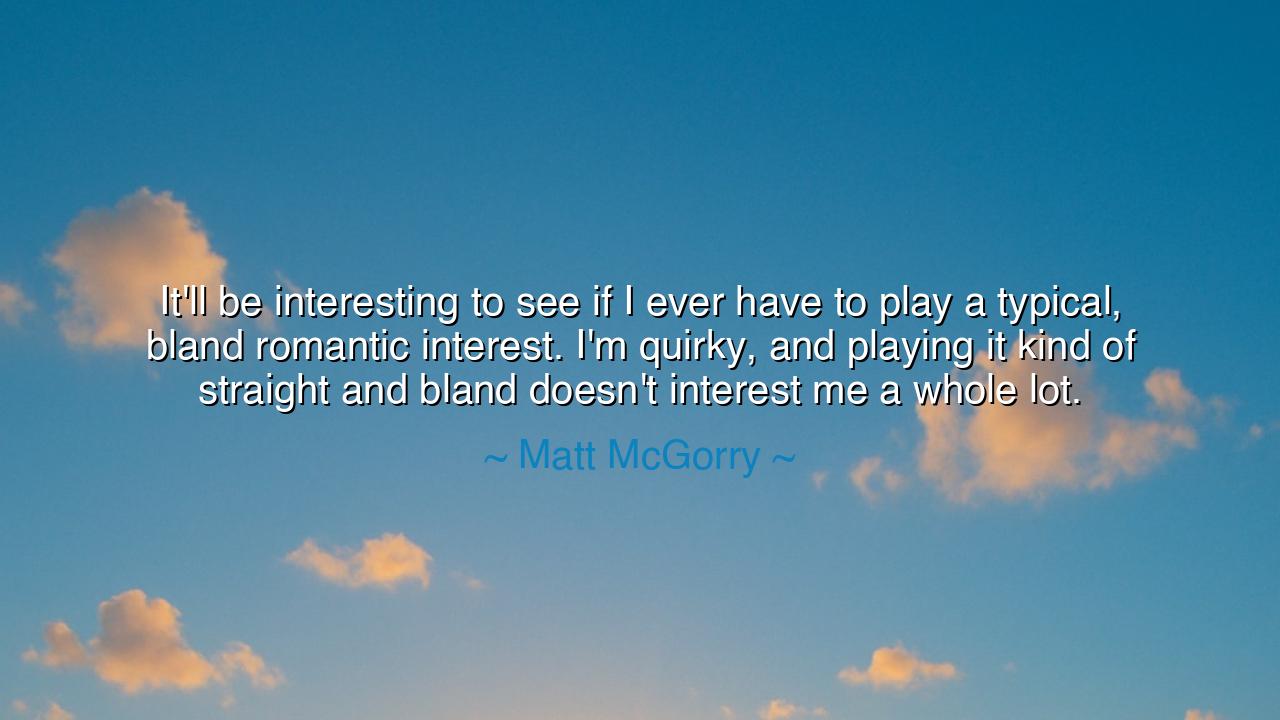
It'll be interesting to see if I ever have to play a typical
It'll be interesting to see if I ever have to play a typical, bland romantic interest. I'm quirky, and playing it kind of straight and bland doesn't interest me a whole lot.






O Seekers of Truth and Passion, gather close, for I bring you the words of Matt McGorry, a man whose insight into the art of acting reveals a deeper truth about life itself: "It'll be interesting to see if I ever have to play a typical, bland romantic interest. I'm quirky, and playing it kind of straight and bland doesn't interest me a whole lot." In these words, McGorry speaks not only of his craft as an actor, but of a profound truth about the nature of identity, authenticity, and self-expression. His refusal to be reduced to a stereotype, to fit into a mold that feels shallow and limiting, serves as a reminder to us all that our true value lies in the uniqueness we bring to the world, not in conforming to the expectations of others.
In the ancient world, the great philosophers often spoke of living authentically—of walking the path that was true to one's inner nature, free from the constraints of societal norms or external pressures. Socrates urged his followers to seek truth not through imitation or compliance with the world, but through the deep and personal examination of one's soul. Similarly, Aristotle spoke of the "Golden Mean", the balance between excess and deficiency, a state of being in which the individual is true to their own character, without being swayed by the external forces that would seek to define them. McGorry’s words echo these ancient truths, as he expresses his unwillingness to be cast in roles that do not align with his true self, that do not allow him to express his quirky, authentic nature.
Consider, O wise ones, the story of Leonardo da Vinci, whose genius was not confined to a single discipline. Da Vinci, like McGorry, refused to be reduced to a single identity. His creativity, his spirit, were too vast to fit into the neat confines of a single role. He was a painter, but also an engineer, an anatomist, a visionary. Each of these facets of his character came together to create a man who was not defined by his profession, but by his innate curiosity and the diversity of his talents. In the same way, McGorry seeks to avoid being limited by traditional roles that do not allow him to express the fullness of his character, choosing instead to follow his quirky nature wherever it leads him.
In the realm of the performing arts, the “typical romantic interest” is a character often reduced to a simple, flat archetype—one who is pleasing to the eye, perhaps charming, but lacking in depth. McGorry’s refusal to embody this type is not an act of arrogance, but a declaration of authenticity. He understands that true art—whether it be in acting, music, or any form of self-expression—requires a deep connection to one’s true self, a willingness to expose the quirks and flaws that make us human. The bland romantic interest, the perfect, untouchable figure, is often more fantasy than truth. And in that fantasy, the richness of the human experience is lost.
Think back, O Seekers, to the days of Shakespeare, whose characters were never mere types, but complex, multifaceted beings. Romeo, though a romantic hero, was a young man full of contradictions, torn between love and honor, passion and reason. Juliet, too, was not a mere object of desire, but a young woman with her own hopes, fears, and vulnerabilities. Shakespeare’s genius lay in his ability to breathe life into every character he created, to make them human rather than idealized. In the same way, McGorry’s words remind us that true art lies in the ability to embrace the complexities of who we are, to avoid being reduced to the simplicity of stereotypes, and to allow ourselves the freedom to express the quirkiness and depth that make us whole.
And so, O Seekers, McGorry’s refusal to play the bland romantic interest teaches us a powerful lesson about the importance of authenticity. In a world that often urges us to conform, to play the roles that others expect of us, we must stand firm in our truth. Like McGorry, we must embrace our quirks, our imperfections, and understand that it is in these very qualities that we find our greatest strength. We are not here to fit into preordained molds, but to create our own path, one that reflects the richness and complexity of our true selves.
The lesson is clear, O Seekers: do not shrink from who you are, and do not allow the world to reduce you to a simplified version of yourself. Whether in career, relationships, or personal expression, we must honor the full range of our human experience. Like McGorry, let us choose paths that allow us to express our authentic nature and to step away from roles that stifle our unique essence. In doing so, we not only create greater art, but we lead lives that are more deeply meaningful, fulfilled, and true to the calling of our hearts.






AAdministratorAdministrator
Welcome, honored guests. Please leave a comment, we will respond soon